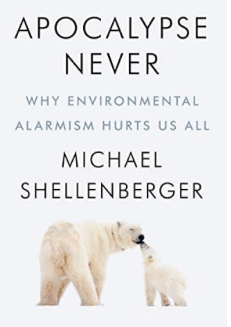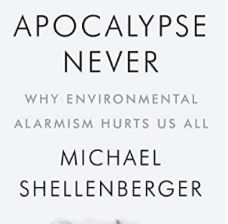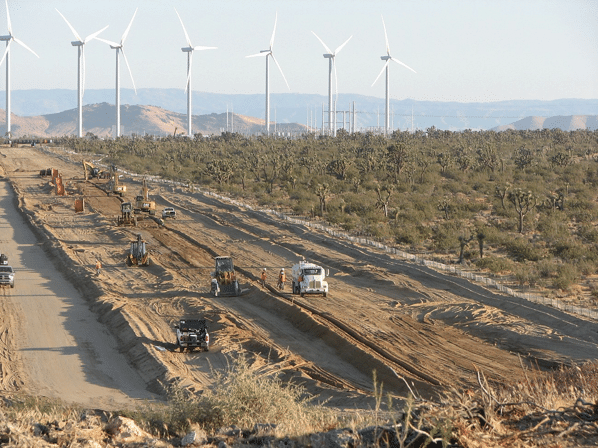Atomic Show #279 – Michael Shellenberger talks about Apocalypse Never

Michael Shellenberger’s new book, Apocalypse Never: Why Environmental Alarmism Hurts Us All has provoked numerous reactions and conversations. It is a carefully researched, 400 page work where 25% of the book is endnotes that document sources for the statements in the book.
Michael is a stranger to the “go along to get along” mode of thinking, writing and speaking. By clearly stating his positions, he generates strong reactions among those who either agree or disagree.
His book documents extensive travels and deep conversations that have led him draw challenging conclusions about many current issues.
He asserts that nuclear weapons are not going to be abandoned. He believes that those who focus their concerns on those horrific devices should be doing everything they can to prevent their use instead of expending effort in a fruitless pursuit of a nuclear weapons-free world.
An important part of reducing risk for nuclear weapons use is to continue to promote development and eliminate scarcity wherever possible.
He notes that cities, factories and increasingly productive agriculture are a proven part of lightening human impacts on the natural environment. They concentrate people and allow more space for nature to flourish. They are also the means by which currently wealthy nations have become wealthy; denying those useful development paths to poor nations solidifies poverty.
He asserts that vegetarianism is an ideology or religion that is strongly influenced by a disgust reaction and that its importance for stabilizing climate has been exaggerated.
He acknowledges that competitors have played a role in the war against the atom, but he believes most campaigners are sincere even if they have been misinformed or misled by their peer groups to fear nuclear energy and radiation. (I maintain that money is far more important than ideology, but there is always room for different opinions.)
Michael is a thinker, a researcher and a writer who makes a strong case for environmental humanism.
He acknowledges that human society has many issues that need to be forthrightly addresses by the best available means, but he is firm in his conclusion that it is counter productive to attempt to stimulate action by frightening people with exaggerated scenarios not backed by solid science.
Please join in the discussion. As always, your comments are welcome.
Podcast: Play in new window | Download (Duration: 50:26 — 57.8MB)
Subscribe: RSS






Thanks for another one.
Environmental Apocalyptic Religion – Wow! I suspect there are more adherents in California than the middle of the country.
I hadn’t quite made the connection that the Green New Deal that has been promoted is anti nuclear. Thanks to Mr. Shellenberger for making that apparent. I had assumed there was some flexibility.
https://en.wikipedia.org/wiki/Green_New_Deal
@Eino:
The Green New Deal being promoted is not itself antinuclear, although some of it’s most fervid proponents most certainly are. The Wikipedia you link says “The approach pushes for transitioning the United States to use 100% renewable, zero-emission energy sources…” but this is not correct. The actual language of House Resolution 109, as introduced by Rep Ocasio-Cortez, states
(2)(B)(i) by eliminating pollution and greenhouse gas emissions as much as technologically feasible;
(2)(C) meeting 100 percent of the power demand in the United States through clean, renewable, and zero-emission energy sources, including—
(i) by dramatically expanding and upgrading renewable power sources; and
(ii) by deploying new capacity;
(2)(D) building or upgrading to energy-efficient, distributed, and “smart” power grids, and ensuring affordable access to electricity;
(2)(N) promoting the international exchange of technology, expertise, products, funding, and services, with the aim of making the United States the international leader on climate action, and to help other countries achieve a Green New Deal;
Now admittedly, the resolution includes the word “nuclear” nowhere at all. But neither does it include “100% renewables”. And although such language did appear in #AOC’s original draft it did not, after quiet consultation with Senate sponsor Ed Markey — himself no friend of nuclear — make the final cut.
Rep Ocasio-Cortez then clarified that “…the Green new Deal does leave the door open for nuclear…”, and that nuclear energy remains a critical part of the conversation:
https://twitter.com/ThirdWayEnergy/status/1262803166053183488
https://www.congress.gov/bill/116th-congress/house-resolution/109/text
…
Meanwhile, back on topic if the wrong side of the aisle, and thanks (if that’s what it is) in some part to the Congressional testimony of one M. Shellenberger, House Minority Leader Kevin McCarthy introduced a
competing resolution by way of four bills that focus upon Carbon Capture, Clean Energy, and Conservation:
“(W)e need to make American energy clean, affordable, and exportable. This vertical — with a focus on advanced nuclear, natural gas, hydropower, and developing innovative clean energy technologies, such as new battery technology — will make that possible.”
https://republicanleader.house.gov/americas-energy-and-environmental-leadership/
Thanks for the clarification. Good links.
Disclaimer – I haven’t read Shellenberger’s book yet. While I concur with a good deal of what he says, his comments on climate change are, I think, misleading – the urge not to frighten your children is understandable, but the truth is more important. Climate scientists are in agreement, for example, that in the past, CO2 levels in the atmosphere of 400 plus parts per million lead to the melting of much of the Greenland and East Antarctic ice sheets, and that if those levels are not reduced, sea level rise of 5 to 40 metres is only a matter of time. Since the base of many Antarctic glaciers slopes down to well below sea level, there’s nothing to stop the ice from collapsing once comparatively warmer water starts undercutting it – which it is doing. As a native Floridian, Rod, you might want your descendants to be able to visit that State without diving gear on. Estimates of the timescale involved have only been getting shorter.
For the couple of million years during which humans evolved, carbon dioxide levels have mostly alternated between about 180 ppm, in the depths of the ice ages, and 280 ppm, in the warmer interglacials. Since the invention of the steam engine, we pushed that past 300 ppm.To go from 300 to 350 ppm took 80 years – to 1990. 350 to 400 ppm only took 27 years, and the increase is accelerating – by now we’re at 415 ppm. Methane and nitrous oxide, much more powerful warming gases, have also increased rapidly. We’re heading for a world as different from the one we grew up in as the ice ages, but in the other direction.
I see that Zeke Hausfather, Director of Climate and Energy at The Breakthrough Institute, has strongly criticised this book. Shellenberger cofounded TBI with Ted Nordhaus, but left it in 2016.
John:
It’s certainly easy and common to paint a scary scenario using historical data and projecting into future.
Mike takes issue with slope of projection, especially in light of our more capable hydrocarbon replacement technology. He strongly recommends EFFECTIVE action as a means of eliminating both basis for and tendency to panic.
The trouble with our ‘ more capable hydrocarbon replacement technology’ is that it hasn’t done nearly enough to reduce hydrocarbon use. The year Dr James Hansen testified to Congress about climate change, 1989, fossil fuels produced about 84% of the world’s energy. Now they make 86%, but we’re using seventy percent more energy. ‘Biofuels’, whether they’re ethanol in US gasoline, cow dung fires in Indian cookers, or fancy German ‘biomethane plants’, are much the same as far as the atmosphere is concerned – they’re still just making heat and CO2.
Agreed – so far.
You are reading Atomic Insights. Our recommended solution path hasn’t YET been adopted widely enough, but there is progress underway. Proven successes will accelerate that progress.
Those who understand the science, the politics, the economics and the emotions associated with energy supply choices will do a better job selling this incredible set of tools. I’m not complacent, but I’m certainly not fearful or panicked about our future.
A substantial part of that is that it hasn’t been allowed to. Germany and Japan in particular replaced a great deal of non-emitting energy consumption with fossil fuels since 2011.
Aviation practically requires hydrocarbon fuels and I don’t know enough about the specifics to talk about industrial energy, but all residential and commercial energy consumption can be handled with electricity and so can most transportation in light-duty vehicles. I am more than 7 years into the ownership of a PHEV and I haven’t yet put 500 gallons of fuel through the engine in over 60,000 miles. Most of my transportation energy comes via the grid, not filling stations. A lot of my electricity probably comes from hydrocarbons, but it doesn’t have to. That can all be decarbonized.. if we aren’t afraid of the atom.
So are you in favor of using Nuclear Power to address this concern? Do you see that Nuclear power is able to power ships, factories, and towns directly in a distributed grid? Do you see that we could produce syn fuels from CO2 and water using Nuclear heat? Do you agree that all of humanity should be given access to large amounts of power?
Yes to all of the above. Only trouble is, it’s not happening. Russia has a few nuclear icebreakers and one cargo vessel, no other country has non-military nuke-powered ships. Kazakhstan’s water desal and power reactor closed in 1999. Wisconsin’s nuclear powered dairy factory switched to coal in 1987. Only a few places in Europe, mainly Eastern Europe, still use waste heat from a power reactor for district heating. Syn fuels are being made out of orangutan habitat, not nuclear. Vietnam and South Africa have cancelled reactors and keep burning coal. Right leaning politicians in three of the heaviest coal using countries – Poland, Australia, and India – talk occasionally about boosting up nuclear power, but they don’t seem to see any urgency in the matter. Now Shellenberger, one of the most prominent advocates for nuclear, is saying – ‘ No rush here, folks! ‘
‘The best lack all conviction, while the worst
Are full of passionate intensity.’
@John ONeill
I think you have misinterpreted Mike’s message. His actions are more similar to those of well trained first responders during a building evacuation. He wants us to move along smartly, but doesn’t want anyone to panic. He is especially concerned about the potential effects of spreading panic to others who need to calmly and effectively move on without harming each other.
Thanks Michael, thanks Rod.
My copy only arrived a week ago, and I’m still but in chapter 2. Sandbagged this afternoon by your UN Food and Agriculture Organization reference, as food security is part of what we’ve been discussing over on Ars Technica: Manage your expectations about the benefits of emissions cuts. Comments touch upon several other topics you discuss on this podcast as well: climate change and enforced energy scarcity. Climate change and enforced lifestyles and residence. ‘Cuz that’s what our purpose is. Otherwise folks would be free to QA,TFY
A Reassuring Lie cartoon:
https://andthentheresphysics.wordpress.com/2020/07/01/apocalypse-never/#comment-178490
Seems to me an appropriate comment on this Quisling of a book.
Doubters of that will want to buy waterfront property in Miami Beach…
David Benson,
So, have you read the book and have specific ideas you want to challenge or are you hoping that your generalization will have weight? I am long long past being shamed into conforming. An inconvient truth was wrong about many of its specific predictions. Thus demonstrating it was not true at all.
I look forward to reading this book after I scrape together a few nickles to purchase it. Or after I rub a little plastic together….
I listened to this on a Sunday – which was great! As a Christian who has lived in many cultures outside the USA I have been exposed to many world views and seen how the societies were structured as a result. Michael’s recognition that many are deeply motivated of by a secular religion – that gives meaning to them was refreshing. His comment on Friedrich Nietzsche’s “death of God” comment helped me understand the broad conceptual framework of Nietzsche and he correct prophecy of it’s outworking in Society. He is correct that the idea is fading – nearly gone in society that we are accountable to a Creator God who will judge us in the future. That concept frames my life but more and more it is a distant echo of a long passed era for many below 40 years old.
So how fast might the seas rise? It appears that Antarctic ice has rapidly melted in the past. Seems likely that this will happen again. Here are some references:
https://bravenewclimate.proboards.com/thread/557/antarctic-melt
I’m now reading ‘Apocalypse Never’
Having finished Chapter 10 ‘All About the Green’ I would say Shellenberger documents well the funding of at least some antinuclear people by fossil fuel interests.